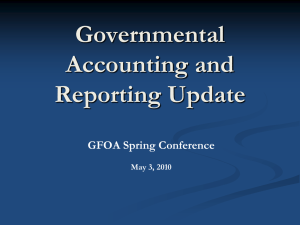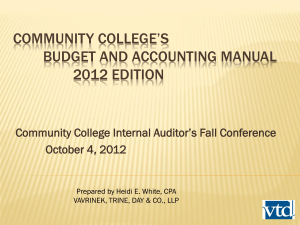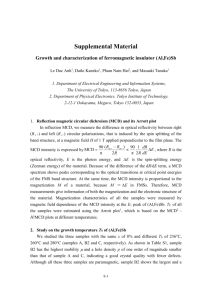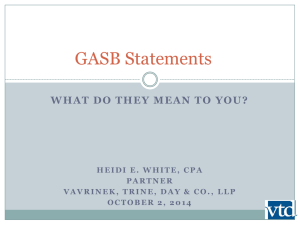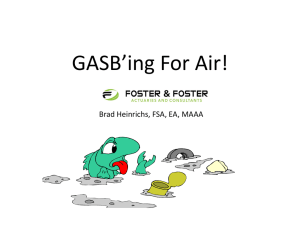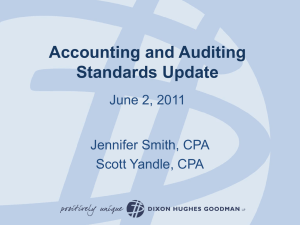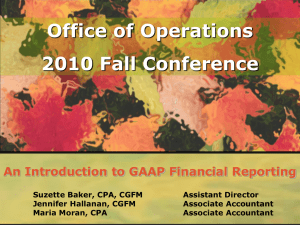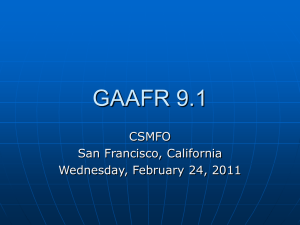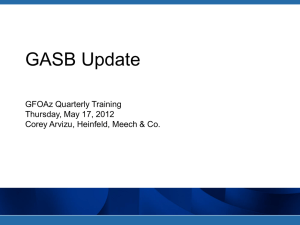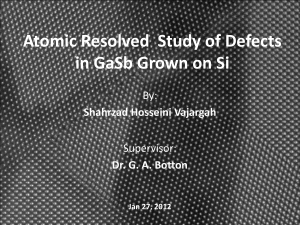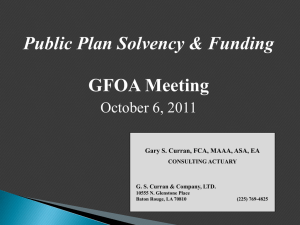Recent GASB Standards and Higher Education
advertisement
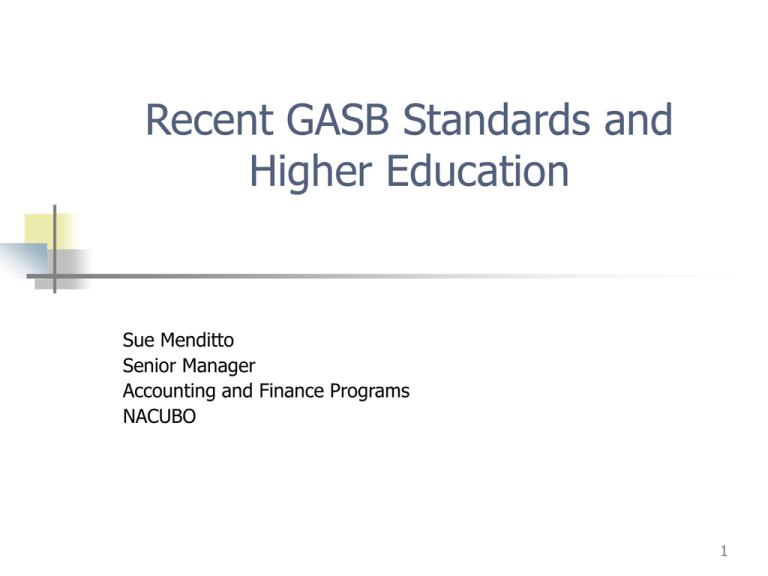
Recent GASB Standards and Higher Education Sue Menditto Senior Manager Accounting and Finance Programs NACUBO 1 GASB 35 Projects and Resources IPEDS Survey considerations Listserv UNC Chapel Hill NACUBO Training Implementation Guide Web links to F/S GASAC NASACT Task force with higher education participation 2 GASB 39 Introduction Officially known as Governmental Accounting Standards Board Statement No. 39, Determining Whether Certain Organizations Are Component Units, an amendment of GASB Statement 14 Commonly referred to as Affiliated Organizations 3 GASB 39 Project History 1990—Project began 1991—GASB Statement No. 14 Paragraph 41 – future guidance 1994—First exposure draft 2001—Second exposure draft NACUBO’s position www.nacubo.org 2002—Final Standard 4 GASB 39 GASB 14 – The Genesis Financial reporting entity Primary government Organizations for which the primary government is financially accountable Other organizations for which the nature and significance of their relationship with the primary government are such that exclusion would cause the reporting entity's financial statements to be misleading or incomplete. 5 GASB 39 Misleading to Exclude Why GASB 39 was issued New standard amends GASB 14 to define legally separate, tax-exempt fund-raising organizations as component units Basis is “misleading to exclude” 6 GASB 39 Misleading to Exclude Matter of professional judgment to determine whether the nature and the significance of relationship with the primary government warrants inclusion. Organizations affiliated with governmental units, agencies, colleges, universities, hospitals, and other entities may warrant inclusion. An example of an affiliated organization that may be evaluated for inclusion is a nonprofit corporation whose purpose is to benefit a governmental university by soliciting contributions and managing those funds. 7 GASB 39 Criteria Must meet three criteria Holds resources (almost) entirely for direct benefit of institution, its component units, or its constituents Institution or its component units are entitled to access majority of resources Individual affiliated organization resources are significant 8 GASB 39 Criteria First criterion Intended to exclude federated fundraising organizations with ability to direct resources to multiple beneficiaries Example: United Way 9 GASB 39 Criteria Second criterion Institution is entitled to or has the “ability to otherwise access” the majority of affiliated organization resources Past trend of providing resources Affiliated organization honors requests from institution Financially interrelated per FASB 136 10 GASB 39 Criteria Third criterion Resources held by individual affiliated organization must be significant to institution If affiliated organization’s resources not significant, fails test (and not reported) Excludes most Parent Teacher Organizations or booster clubs supporting public school districts 11 GASB 39 Reporting Requirement Affiliated Organizations that meet the criteria must be included in an institution’s financial statements Discrete presentation is required Statement of Net Assets Statement of Revenues, Expenses and Changes in Net Assets Statement of Cash Flows not required Unless no affiliated organization audit Institution prepares the cash flow statement 12 GASB 39 Display Options Institution and sole component unit in separate columns on same page Component unit on succeeding page Institution and multiple component units in separate columns on same page Multiple component units in separate columns on succeeding page 13 GASB 39 Display Considerations FASB entities Option to present on separate page immediately following each GASB statement Can adapt FASB classifications to present on same page using GASB classifications GASB entities Rare One institution out of 160 in a NACUBO training 14 GASB 39 Display Considerations Combined totals for multiple component units Compatibility Requires detail in footnote disclosure Compatibility of terms Program expenses Natural expenses Management’s Discussion and Analysis 15 GASB 39 Footnote Disclosures Required disclosures Description of the component unit Nature and amount of significant transactions Explanation of transaction differences due to different reporting periods Other disclosures essential for fair presentation—a matter of professional judgment 16 GASB 39 Effective Date Fiscal years beginning after June 15, 2003 For most colleges and universities, fiscal year ending June 30, 2004 Earlier adoption encouraged Failure to implement could result in adverse financial statement opinion for institution 17 GASB 39 Implementation Issues Review each potential component unit Resolve display issues Assess impact on audit schedule Assess impact on audit fees Develop communication strategy Primary Government Board / Executive Management Affiliated Organizations 18 GASB 39 Foundation Issues Work with the Institution Compliance by institution is mandatory, if applicable Better to cooperate than have decisions made without foundation’s input 19 GASB 39 Foundation Issues Consequences of Non-cooperation Direct None—unless special state statutes apply Indirect Strained relationship with institution Rescission of authority to use institution’s name in fundraising 20 GASB 39 Conclusion GASB desire for increased disclosure and transparency Began with GASB 34/35 reporting changes Also seen in current Performance Measurement Project NACUBO web-cast: www.nacubo.org 21
